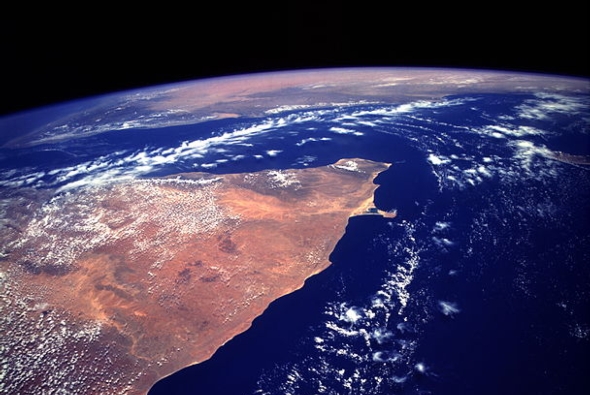PBS: Escaping Eritrea … [Read More...] about ካብ ውሽጢ ቤት ማእሰርታት ኤርትራ
Horn of Africa Grows Hotter and Drier
Camille von Kaenel | October 13, 2015 | Scientific American
The region is warming and drying faster than climate models have predicted

The Horn of Africa is warming and drying faster now than in the past 2,000 years, new research into ancient marine sediments found. That contradicts global climate models, which show the geopolitically unstable region getting wetter as emissions boost temperatures worldwide.
“It changes our view of how greenhouse gases will affect future warming in the Horn, as we had all assumed, myself included, that rising emissions would lead to rainier seasons,” said Jessica Tierney, a paleoclimatologist at the University of Arizona and the lead author of the new paper, published in Science Advances last Friday.
Violent conflicts, droughts and famines have already wracked the area of Eastern Africa roughly encompassing Somalia, Ethiopia, Eritrea, Djibouti and Sudan. Climate change could be a “threat multiplier,” Tierney and her colleagues said, exacerbating those stresses.
“It’s a geopolitical powder keg that’s experiencing tremendous food insecurity, water insecurity, geopolitical insecurity, and we’re adding to that climate insecurity,” said Peter deMenocal, a co-author and the director of the Center for Climate and Life at Columbia University’s Lamont-Doherty Earth Observatory.
The new findings highlight the need for better climate data in the area, he said.
“There are NGO [nongovernmental organization] groups that are planning in expectation that the region is going to get wetter,” he added. “We need to do much more thorough work, particularly in places that are of greatest interest to understand how climate affects these areas.”
Evading pirates to get sediment samples
The search for a more accurate climate forecast faces several obstacles. Rainfall dynamics in the area are complicated: There are two rainy seasons influenced by different atmospheric processes. The area also has a scarcity of past and current weather records. Political instability in the region is making research difficult, deMenocal added.
His team had to evade pirates when gathering cores of marine sediments in the Gulf of Aden in 2001. The Atlantic recounted the expedition’s story. No oceanographic research vessel has returned to the area to do research since.
To tease out ancient climate data, the researchers then extracted traces of land plants called leaf waxes from the marine sediments. By analyzing their chemical makeup, the researchers were able to estimate the dry and wet patterns of the region over the past two millenia.
The goal was to put the recent series of droughts in longer historical context to estimate how much warming natural variability could explain. Though the area could have experienced some peaks of aridity similar to today’s in the past, according to the data, the current rate of warming and drying is unprecedented.
In the past half-century, signs of rising carbon emissions also appeared. DeMenocal called the increases a “smoking gun” that indicated human burning of fossil fuels played at least some part in the region’s recent aridity.
“The fact they line up doesn’t tell us that’s where the future will be, but if you were a betting person, you would bet that this region of Africa could become more dry,” said David Battisti, an atmospheric scientist at the University of Washington who studies climate variability.
He said the mismatch between general circulation models and the limited on-the-ground weather records for the Horn of Africa is a “decade-long” problem, persisting through several generations of models.
Short and long rain seasons
The region sees two rainy seasons: “Long” rains in March through May and “short” rains in October. Models are not good at predicting rainfall worldwide, including places like southeast China or northern Australia, Battisti said.
“In [the Horn of Africa], all models agree that it’s going to be wet, but they start with poor climatology,” he said.
General circulation models missed part or all of the long rains, the new paper showed. Those are associated with large-scale circulation patterns over northern Africa, said Kerry Cook, an atmospheric scientist at the University of Texas, Austin, who has researched the climate of Africa. Models also tended to overestimate variability in the short rains, which are sensitive to Indian Ocean sea surface temperatures, she said.
“All these nuances and complications, it means you need to take a regional approach, with a higher resolution and the ability to select parameterization that works well in your region,” she said.
Her simulations, run at a resolution of 30 kilometers instead of the 200 kilometers or so in global models, show that the Horn of Africa will get drier in the future as carbon emissions rise.
She still comes at the simulation with the same amount of information as global models, she said. Nailing down the links between atmosphere, ocean and land in the region remains a hard task.
“It’s a really important research question,” said Battisti. “It’s a problem waiting to be solved; I’m not clear it can be solved because of the biases in the world and relative paucity of observations.”
